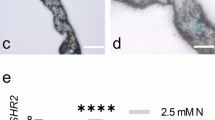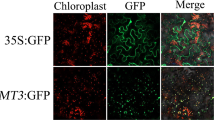Abstract
Key message
Genetic improvement through overexpressing PuP5CS in switchgrass is feasible for enhancing plant salt stress tolerance.
Abstract
Switchgrass (Panicum virgatum L.) has developed into a dedicated bioenergy crop. To improve the biomass production of switchgrass grown on different types of soil, abiotic stress tolerance traits are considered for its genetic improvement. Proline accumulation is a widespread response when plants are subjected to abiotic stresses such as drought, cold and salinity. In plants, P5CS gene encodes the key regulatory enzyme that plays a crucial role in proline biosynthesis. Here, we introduced the PuP5CS gene (from Puccinellia chinampoensis) into switchgrass by Agrobacterium-mediated transformation. Transgenic lines overexpressing the PuP5CS gene showed phenotypic advantages, in leaf width, internode diameter, internode length, tiller numbers and precocious flowering under normal conditions, and the transgenic lines displayed better regenerative capacity in forming more tillers after harvest. Moreover, the PuP5CS gene enhanced the salt tolerance of transgenic switchgrass by altering a wide range of physiological responses. In accordance with the physiological results, histological analysis of cross sections through the leaf blade showed that the areas of bulliform cells and bundle sheath cells were significantly increased in PuP5CS-overexpressing leaves. The expression levels of ROS scavenging-associated genes in transgenic plants were higher than in control plants under salt stress. The results show that genetic improvement through overexpressing PuP5CS in switchgrass is feasible for enhancing plant stress tolerance.









Similar content being viewed by others
References
Alia, Saradhi PP, Mohanty P (1993) Proline in relation to free radical production in seedlings of Brassica juncea, raised under sodium chloride stress. Plant Soil 155–156(1):497–500
Armengaud P, Thiery L, Buhot N, Grenier-de MD, Savouré A (2004) Transcriptional regulation of proline biosynthesis in Medicago truncatula reveals developmental and environmental specific features. Physiol Plant 120(3):442–450
Bartels D, Sunkar R (2005) Drought and salt tolerance in plants. Crit Rev Plant Sci 24(1):23–58
Ben RK, Abdelly C, Savouré A (2014) How reactive oxygen species and proline face stress together. Plant Physiol Biochem 80C:278–284
Bhatnagar-Mathur P, Vadez V, Devi MJ, Lavanya M, Vani G, Sharma KK (2009) Genetic engineering of chickpea (Cicer arietinum, L.) with the P5CSF129A, gene for osmoregulation with implications on drought tolerance. Mol Breed 23(4):591–606
Chen W, Baldwin TC (2007) An improved method for the fixation, embedding and immunofluorescence labeling of resin-embedded plant tissue. Plant Mol Biol Rep 25(1–2):27–35
Chen H, He H, Yu D (2011) Overexpression of a novel soybean gene modulating Na+ and K+ transport enhances salt tolerance in transgenic tobacco plants. Physiol Plant 141(1):11–18
Deinlein U, Stephan AB, Horie T, Luo W, Xu G, Schroeder J (2014) Plant salt-tolerance mechanisms. Trends Plant Sci 19(6):371–379
Delauney AJ, Verma DPS (1993) Proline biosynthesis and osmoregulation in plants. Plant J 4(4):215–223
Doyle JJ, Doyle JL (1987) A rapid DNA isolation procedure for small quantities of fresh leaf tissue. Phytochem Bull 19(1):11–15
Funck D, Winter G, Baumgarten L, Forlani G (2012) Requirement of proline synthesis during Arabidopsis reproductive development. BMC Plant Biol 12(1):191
Hardin CF, Fu C, Hisano H, Xiao X, Shen H, Stewart CN (2013) Standardization of switchgrass sample collection for cell wall and biomass trait analysis. BioEnergy Res 6(2):755–762
Hare PD, Cress WA (1997) Metabolic implications of stress-induced proline accumulation in plants. Plant Growth Regul 21(2):79–102
Hmidasayari A, Gargouribouzid R, Bidani A, Jaoua L, Savoure A, Jaoua S (2005) Overexpression of delta1-pyrroline-5-carboxylate synthetase increases proline production and confers salt tolerance in transgenic potato plants. Plant Sci 169(4):746–752
Houimli SIM, Denden M, Mouhandes BD (2010) Effects of 24-epibrassinolide on growth, chlorophyll, electrolyte leakage and proline by pepper plants under NaCl-stress. Eurasian J Biosci 4(4):96–104
Hu CA, Delauney AJ, Verma DP (1992) A bifunctional enzyme (delta 1-pyrroline-5-carboxylate synthetase) catalyzes the first two steps in proline biosynthesis in plants. Proc Natl Acad Sci USA 89(19):9354–9358
Huang YH, Guan C, Liu YR, Zhang YW (2017) Enhanced growth performance and salinity tolerance in transgenic switchgrass via overexpressing vacuolar Na+(K+)/H+ antiporter gene (PvNHX1). Front Plant Sci 8:458
Jha B, Mishra A, Jha A, Joshi M (2013) Developing transgenic jatropha using the SbNHX1 gene from an extreme halophyte for cultivation in saline wasteland. PLoS One 8:e71136
Kaikavoosi K, Kad TD, Zanan RL, Altafhusain BN (2015) 2-Acetyl-1-pyrroline augmentation in scented indica rice (Oryza sativa L.) varieties through ∆1-pyrroline-5-carboxylate synthetase (P5CS) gene transformation. Appl Biochem Biotechnol 177(7):1466–1479
Kant S, Kant P, Raveh E, Barak S (2006) Evidence that differential gene expression between the halophyte, Thellungiella halophila, and Arabidopsis thaliana is responsible for higher levels of the compatible osmolyte proline and tight control of Na+ uptake in T. halophila. Plant Cell Environ 29(7):1220–1234
Kavi KPB, Hima KP, Sunita MS, Sreenivasulu N (2015) Role of proline in cell wall synthesis and plant development and its implications in plant ontogeny. Front Plant Sci 6(544):544
Keshwani DR, Cheng JJ (2009) Switchgrass for bioethanol and other value-added applications: a review. Biores Technol 100:1515–1523
Kishor P, Hong Z, Miao GH, Hu CA, Verma DP (1995) Overexpression of [delta]-pyrroline-5-carboxylate synthetase increases proline production and confers osmotolerance in transgenic plants. Plant Physiol 108(4):1387–1394
Kiyosue T, Yoshiba Y, Yamaguchishinozaki K, Shinozaki K (1996) A nuclear gene encoding mitochondrial proline dehydrogenase, an enzyme involved in proline metabolism, is upregulated by proline but downregulated by dehydration in Arabidopsis. Plant Cell 8(8):1323–1335
Kökten K, Karaköy T, BakoğLu A (2010) Determination of salinity tolerance of some lentil (Lens culinaris M.) varieties. J Food Agric Environ 8(1):140–143
Kumar V, Shriram V, Kishor PBK, Narendra J, Shitole MG (2010) Enhanced proline accumulation and salt stress tolerance of transgenic indica rice by over-expressing P5CSF129A gene. Plant Biotechnol Rep 4(1):37–48
Li ZG, Baldwin CM, Hu Q, Liu HB, Luo H (2010) Heterologous expression of Arabidopsis H+-pyrophosphatase enhances salt tolerance in transgenic creeping bentgrass (Agrostis stolonifera L.). Plant Cell Environ 33(2):272–289
Li H, Guo H, Zhang X, Zhang XZ, Fu JM (2014) Expression profiles of Pr5CS1, and Pr5CS2, genes and proline accumulation under salinity stress in perennial ryegrass (Lolium perenne L.). Plant Breed 133(2):243–249
Liu YR, Cen HF, Yan JP, Zhang YW, Zhang WJ (2015) Inside out: high-efficiency plant regeneration and Agrobacterium-mediated transformation of upland and lowland switchgrass cultivars. Plant Cell Rep 34(7):1099–1108
Liu SJ, Huang YH, He CJ, Zhang YW (2016) Cloning, bioinformatics and transcriptional analysis of caffeoyl-coenzyme a 3-O-methyltransferase in switchgrass under abiotic stress. J Integr Agri 15(3):636–649
Lo SF, Ho TD, Liu YL, Chen KT (2017) Ectopic expression of specific GA2 oxidase mutants promotes yield and stress tolerance in rice. Plant Biotechnol J 15(7):850–864
McLaughlin SB, Kiniry JR, Taliaferro CM (2006) Projecting yield and utilization potential of switchgrass as an energy crop. Adv Agron 90:267–297
Munns R, Wallace PA, Teakle NL, Colmer TD (2010) Measuring soluble ion concentrations (Na+, K+, Cl–) in salt-treated plants. Methods Mol Biol 639:371–382
Oliver MJ, Cushman JC, Koster KL, Zhu JK (2010) Plant stress tolerance. Methods Mol Biol 2:39
Parida AK, Das AB (2005) Salt tolerance and salinity effects on plants: a review. Ecotoxicol Environ Saf 60(3):324
Pavei D, Gonçalves-Vidigal MC, Schuelter AR (2016) Response to water stress in transgenic (p5cs gene) wheat plants (Triticum aestivum L.). Aust J Crop Sci 10(6):776–783
Peter K, Mohr H (1974) Control of phenylalanine ammonia-lyase and ascorbate oxidase in the mustard seedling by light and hoagland’s nutrient solution. Z Nat C 29(5–6):222–228
Porgali ZB, Yurekli F (2005) Salt stress-induced alterations in proline accumulation, relative water content and superoxide dismutase (SOD) activity in salt sensitive Lycopersicon esculentum and salt-tolerant L. pennellii. Acta Bot Hung 47(1):173–182
Rai AN, Penna S (2013) Molecular evolution of plant P5CS gene involved in proline biosynthesis. Mol Biol Rep 40(11):6429–6435
Redondogómez S, Mateosnaranjo E, Davy AJ (2007) Growth and photosynthetic responses to salinity of the salt-marsh shrub atriplex portulacoides. Ann Bot 100(3):555–563
Richter JA, Erban A, Kopka J (2015) Metabolic contribution to salt stress in two maize hybrids with contrasting resistance. Plant Sci Int J Exp Plant Biol 233:107–115
Said KT, Busaidi A, Farag KM (2015) The use of electrolyte leakage procedure in assessing heat and salt tolerance of Ruzaiz date palm (Phoenix dactylifera L.) cultivar regenerated by tissue culture and offshoots and treatments to alleviate the stressful injury. J Hortic For 7:104–111
Sakhno LO (2013) Plant biomass increase: recent advances in genetic engineering. Biopolym Cell 29(6):443–453
Servet C, Ghelis T, Richard L, Zilberstein A, Savoure A (2012) Proline dehydrogenase: a key enzyme in controlling cellular homeostasis. Front Biosci 17(1):607
Sharma S, Verslues PE (2010) Mechanisms independent of abscisic acid or proline feedback have a predominant role in transcriptional regulation of proline metabolism during low water potential and stress recovery. Plant Cell Environ 33(11):1838–1851
Sticklen M (2006) Plant genetic engineering to improve biomass characteristics for biofuels. Curr Opin Biotechnol 17(3):315–319
Strizhov N, Abrahám E, Okrész L, Blickling S, Zilberstein A (1997) Differential expression of two P5CS genes controlling proline accumulation during salt-stress requires ABA and is regulated by ABA1, ABI1 and AXR2 in Arabidopsis. Plant J 12(3):557–569
Su J, Wu R (2004) Stress-inducible synthesis of proline in transgenic rice confers faster growth under stress conditions than that with constitutive synthesis. Plant Sci 166(4):941–948
Su M, Li XF, Ma XY, Peng XJ, Zhao A, Cheng LQ (2011) Cloning two P5CS genes from bioenergy sorghum and their expression profiles under abiotic stresses and JA treatment. Plant Sci 181(6):652–659
Surekha C, Kumari KN, Aruna LV, Suneetha G, Arundhati A, Kavi KPB (2014) Expression of the Vigna aconitifolia P5CSF129A gene in transgenic pigeon pea enhances proline accumulation and salt tolerance. Plant Cell Tissue Organ Cult 116(1):27–36
Szabados L, Savouré A (2010) Proline: a multifunctional amino acid. Trends Plant Sci 15(2):89–97
Székely G, Abrahám E, Cséplo A, Rigó G, Zsigmond L, Csiszár J (2008) Duplicated P5CS genes of Arabidopsis play distinct roles in stress regulation and developmental control of proline biosynthesis. Plant J 53(1):11–28
Vendruscolo ECG, Schuster I, Pileggi M, Capim CA, Molinari H, Marur CJ (2007) Stress-induced synthesis of proline confers tolerance to water deficit in transgenic wheat. J Plant Physiol 164(10):1367–1376
Wang YS, Ding MD, Pang Y, Gu XG, Gao LP, Xia T (2013) Analysis of interfering substances in the measurement of malondialdehyde content in plant leaves. Am J Biochem Biotechnol 9(3):6293–6297
Wang G, Zhang J, Wang G, Fan X, Sun X, Qin H (2014) Proline responding1 plays a critical role in regulating general protein synthesis and the cell cycle in Maize. Plant Cell 26(6):2582–2600
Yoshiba Y, Kiyosue T, Katagiri T, Ueda H, Mizoguchi T, Yamaguchi-Shinozaki K (1995) Correlation between the induction of a gene for delta 1-pyrroline-5-carboxylate synthetase and the accumulation of proline in Arabidopsis thaliana under osmotic stress. Plant J Cell Mol Biol 7(5):751–760
Yoshiba Y, Kiyosue T, Nakashima K, Yamaguchi-shinozaki K, Shinozaki K (1997) Regulation of levels of proline as an osmolyte in plants under water stress. Plant Cell Physiol 38(10):1095–1102
Zhang X, Tang W, Liu J, Liu Y (2014) Co-expression of rice OsP5CS1 and OsP5CS2 genes in transgenic tobacco resulted in elevated proline biosynthesis and enhanced abiotic stress tolerance. Chin J Appl Environ Biol 20(4):717–722
Zhu X, Li X, Zou Y, Chen W, Lu W (2012) Cloning, characterization and expression analysis of ∆1-pyrroline-5-carboxylate synthetase (P5CS) gene in harvested papaya (Carica papaya) fruit under temperature stress. Food Res Int 49(1):272–279
Acknowledgements
Funding for this work was provided by the Ministry of Science And Technology, China (2012AA101801), National Natural Science Foundation of China (31672478) and Natural Science Foundation of Beijing (6162016).
Author information
Authors and Affiliations
Corresponding author
Ethics declarations
Conflict of interest
The authors declare that they have no conflict of interest.
Additional information
Communicated by Leena Tripathi.
Electronic supplementary material
Below is the link to the electronic supplementary material.
Rights and permissions
About this article
Cite this article
Guan, C., Huang, YH., Cui, X. et al. Overexpression of gene encoding the key enzyme involved in proline-biosynthesis (PuP5CS) to improve salt tolerance in switchgrass (Panicum virgatum L.). Plant Cell Rep 37, 1187–1199 (2018). https://doi.org/10.1007/s00299-018-2304-7
Received:
Accepted:
Published:
Issue Date:
DOI: https://doi.org/10.1007/s00299-018-2304-7




